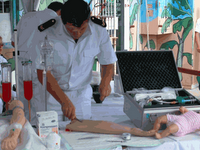How to Survive a Hospital Visit

The latest issue (Oct. 06) of Smart Money magazine has an article called "10 Things Your Hospital Won't Tell You" that reminded me of the times the wife was in the hospital. There were some touch and go moments. A few times I was unsure whether she or I would make it out alive.
Here are some strategies that helped me (and that might help you, the healthy one) when a loved one -- wife, child or cat -- enters the hospital.
You might think the goal is to leave the hospital healthy (Oh, how I envy your naivete). The real goal is for your loved one to leave better than they entered without costing you an arm and a leg. I mean that literally and figuratively.
Here are the things you are battling, that you need to keep an eye on:
- Hospital errors.
- Your (healthy one's) mental well-being.
2. Your mental health. Trust me. Your imagination will run wild, run amazingly depressingly and pessimistic scenarios. All in the name of preparing you for the worst. STOP. You are the strong one. You are the healthy one. You do not have the luxury to give in to your weak impulses.
Here is a simple method to deal with both of the above. Pretend you're a reporter. Keep a journal. Ask lots of questions and write everything down.
This is what I did when my wife had complications with our first child. And also when I had to take her in to the ER. I didn't have a notebook. But I grabbed some scrap paper and jotted everything down.
- Date, time, doctors and nurses' names, medication, diagnoses.
- I saved all the receipts.
One other thing: take care of yourself. This is much harder to do. You become so worried and so wraped up taking care of your loved one that you neglect to wash, to rest, to eat. But you must remain strong. (PS. It's okay to breakdown. Go ahead and cry. Just do it away from the patient
I sinerely hope you don't need these tips, but if you find you and your loved one in a hospital, remember two things.
- Keep a journal.
- Don't forget to take care of yourself.

0 Comments:
Post a Comment
<< Home